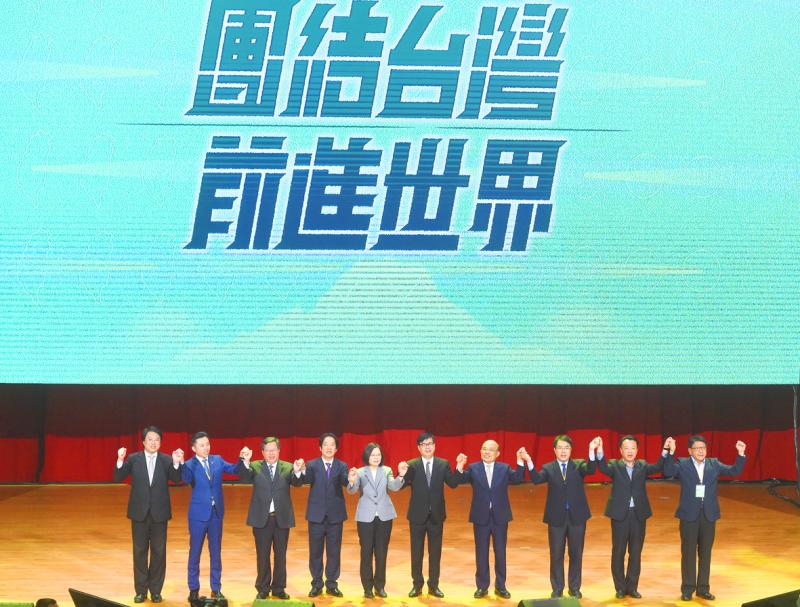Constitutional reform is one of the most important advancements for Taiwan, President Tsai Ing-wen (蔡英文) said yesterday, adding that items that should be prioritized include lowering the voting age from 20 to 18, and abolishing the Examination Yuan and the Control Yuan, as the issues have cross-party consensus.
Tsai made the remarks in a speech at the Democratic Progressive Party’s (DPP) national congress in Taipei, which she presided over in her capacity as party chairperson.
Tsai highlighted major missions for the party.

Photo: Chien Jung-fong, Taipei Times
First, the DPP should quickly propose guidelines on constitutional amendments related to lowering the voting age — along with other civil rights provided to citizens over 20 — as well as abolishing the Examination Yuan and the Control Yuan, so that party caucuses can discuss the issues at the legislature’s Constitutional Amendment Committee, Tsai said.
Tsai also called on opposition parties, saying that all parties should cherish the “constitutional moment.”
Second, the DPP should dedicate more resources to cultivating young talent for the nation, she said.
Third, the party should continue to deepen democracy in Taiwan and defend its democratic values amid global uncertainties, Tsai said, citing the situation in Hong Kong, where freedom and human rights have become seriously undermined after China imposed national security legislation on the territory.
As a party that survived totalitarian oppression, the DPP would share Taiwan’s experience in establishing democratic institutions with the international community, and support Hong Kongers fighting for democracy, Tsai said.
Fourth, the DPP should “recover its glory in Kaohsiung” by winning the city’s mayoral by-election, which is set for Aug. 15, she said.
Tsai also said that Taiwan’s economic recovery amid the COVID-19 pandemic has had a good start, as crowds were seen in various locations nationwide on the first weekend following the release of the government’s Triple Stimulus Vouchers, which she said was a sign of increased business opportunities.
However, the DPP cannot be complacent about its policy results, otherwise public support could slip away, Tsai said, telling party members that “integrity, diligence and love for the country” remain the party’s chief commitments.
Chinese Nationalist Party (KMT) spokeswoman Hung Yu-chien (洪于茜) said that constitutional reform should be carried out with cross-party consensus, but the Tsai administration does nothing but “exercise crushing tyranny of the majority.”
The attitude shows no respect for opposition parties and creates “extremely unequal power between the ruling and opposition parties” at the legislature, Hung added.
The KMT believes the DPP is bringing up abolishing the Examination Yuan and the Control Yuan to shift focus away from its incompetence at governing the nation and its tyrannical leadership, she said.
The KMT would establish a constitutional amendment committee comprising party members and academics to discuss issues, including the Examination Yuan and the Control Yuan, she said.
The KMT would not finalize its stance on the matter before that, she added.
New Power Party caucus whip Chiu Hsien-chih (邱顯智) said his party would support constitutional reform, as it would address issues that have long been unresolved.
Taiwan People’s Party Legislator Jang Chyi-lu (張其祿) agreed, saying that abolishing the two branches of government and lowering the voting age to 18 are also the party’s long-time appeals.
Additional reporting by Lin Liang-sheng and Hsieh Chun-lin

The Central Election Commission has amended election and recall regulations to require elected office candidates to provide proof that they have no Chinese citizenship, a Cabinet report said. The commission on Oct. 29 last year revised the Measures for the Permission of Family-based Residence, Long-term Residence and Settlement of People from the Mainland Area in the Taiwan Area (大陸地區人民在台灣地區依親居留長期居留或定居許可辦法), the Executive Yuan said in a report it submitted to the legislature for review. The revision requires Chinese citizens applying for permanent residency to submit notarial documents showing that they have lost their Chinese household record and have renounced — or have never

A magnitude 5.6 earthquake struck off the coast of Yilan County at 12:37pm today, with clear shaking felt across much of northern Taiwan. There were no immediate reports of damage. The epicenter of the quake was 16.9km east-southeast of Yilan County Hall offshore at a depth of 66.8km, Central Weather Administration (CWA) data showed. The maximum intensity registered at a 4 in Yilan County’s Nanao Township (南澳) on Taiwan’s seven-tier scale. Other parts of Yilan, as well as certain areas of Hualien County, Taipei, New Taipei City, Taoyuan, Hsinchu County, Taichung and Miaoli County, recorded intensities of 3. Residents of Yilan County and Taipei received

Taiwan has secured another breakthrough in fruit exports, with jujubes, dragon fruit and lychees approved for shipment to the EU, the Ministry of Agriculture said yesterday. The Animal and Plant Health Inspection Agency on Thursday received formal notification of the approval from the EU, the ministry said, adding that the decision was expected to expand Taiwanese fruit producers’ access to high-end European markets. Taiwan exported 126 tonnes of lychees last year, valued at US$1.48 million, with Japan accounting for 102 tonnes. Other export destinations included New Zealand, Hong Kong, the US and Australia, ministry data showed. Jujube exports totaled 103 tonnes, valued at

BIG SPENDERS: Foreign investors bought the most Taiwan equities since 2005, signaling confidence that an AI boom would continue to benefit chipmakers Taiwan Semiconductor Manufacturing Co’s (TSMC, 台積電) market capitalization swelled to US$2 trillion for the first time following a 4.25 percent rally in its American depositary receipts (ADR) overnight, putting the world’s biggest contract chipmaker sixth on the list of the world’s biggest companies by market capitalization, just behind Amazon.com Inc. The site CompaniesMarketcap.com ranked TSMC ahead of Saudi Aramco and Meta Platforms Inc. The Taiwanese company’s ADRs on Tuesday surged to US$385.75 on the New York Stock Exchange, as strong demand for artificial intelligence (AI) applications led to chip supply constraints and boost revenue growth to record-breaking levels. Each TSMC ADR represents